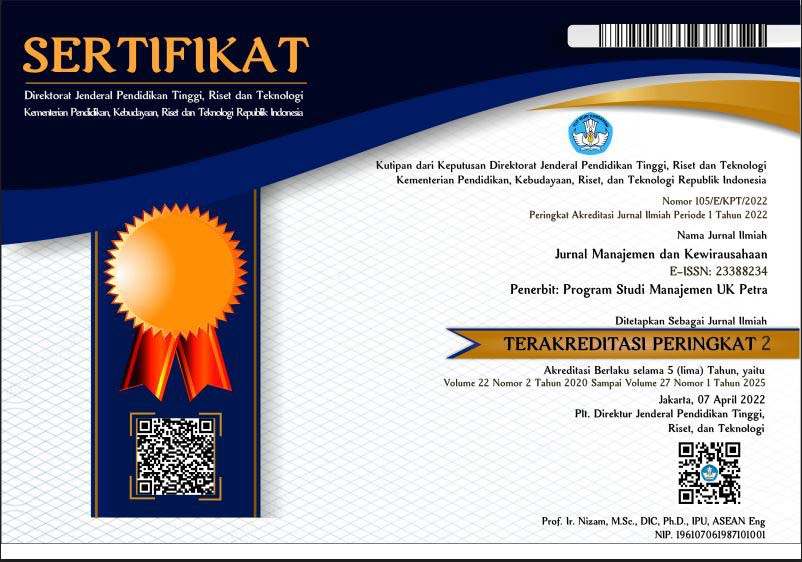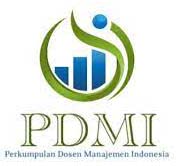THE ACCEPTANCE OF SUSTAINABLE FOOD CONCEPT: A QUALITATIVE EXPLORATION IN STENDEN UNIVERSITY HOTEL, THE NETHERLANDS
 :
:
https://doi.org/10.9744/jmk.19.2.91-98
Keywords:
Sustainability concept in the food industry, planned behavior, Dutch cuisine.Abstract
As customers concern more about the environment, sustainable food demands, which are locally produced, organic, seasonal, and vegetarian or semi-vegetarian, are increasing. Besides, Theory of Planned Behavior (TPB) explains that behavior is guided by intentions with the factors of attitude, subjective norm, and perceived behavioral control to predict food choices; food purchasing habits and intake; and attitudes and preferences. Therefore, the research purpose is to examine customers’ acceptance of The Netherlands restaurant implementing sustainable food concept using TPB. Data analysis of 10 semi structured interviews shows that the customers of Restaurant NL are more likely guided by external factors of subjective norms: work related dine-in; others’ encouragement to eat more healthy and more responsibly, as the intentions are to have sustainable benefits.References
Ajzen, I. (1992). Persuasive communication theory in social psychology: A historical perspective. In M. J. Manfredo (Ed.), Influencing human behavior: Theory and applications in recreation, tourism, and natural resource management (pp.1–27). Champaign, IL: Sagamore Publishing. [CrossRef]
Barrick, M. R., Parks, L., & Mount, M. K. (2005). Self-monitoring as a moderator of the relationships between personality traits and performance. Personnel Psychology, 58(3), 745–767. [CrossRef]
Comrey, A. L. & Backer, T. E. (1975). Detection of faking on the Comrey personality scales. Multivariate behavioral research, 10(3), 311–319. [CrossRef]
Goldberg, L. R. (1999). International personality item pool: A scientific collaboratory for the development of advanced measures of personality and other individual differences. Available at ipip. ori.org/ipip/. Accessed February, 1, 2017. [CrossRef]
Hair, J. F., Anderson, R. E., Babin, B. J., & Black, W. C. (2010). Multivariate data analysis: A global perspective, 7. Pearson Upper Saddle River, NJ. [CrossRef]
Jerneić, Ž. & Grabovac, M. T. (2015). Applicant faking behavior on personality questionnaires: An empirical model of motivational faking determinants. Paper presented at the 14th European Congress of Psychology. [CrossRef]
John, O. (1990). The “big five” factor taxonomy: Dimensions of personality the natural language and questionnaires. In. L.A. Pervin (Ed.), Handbook of personality: Theory and research, 66–100. New York: Guilford Press. [CrossRef]
Kashy, D. A. & DePaulo, B. M. (1996). Who lies? Journal of Personality and Social Psychology, 70(5), 1037–1051. [CrossRef]
Kiefer, C. & Benit, N. (2016). What is Applicant faking behavior? A review on the current state of theory and modeling techniques. Journal of European Psychology Students, 7(1), 9–19. [CrossRef]
Kristof-Brown, A., Barrick, M. R., & Franke, M. (2002). Applicant impression management: Dispositional influences and consequences for recruiter perceptions of fit and similarity. Journal of Management, 28(1), 27–46. [CrossRef]
Kuncel, N. R. & Borneman, M. J. (2007). Toward a new method of detecting deliberately faked personality tests: The use of idiosyncratic item responses. International Journal of Selection and Assessment, 15(2), 220–231. [CrossRef]
Landy, F. J. & Conte, J. M. (2004). Work in the 21st century: An introduction to industrial and organizational psychology. Boston: McGraw-Hill. [CrossRef]
Levashina, J. & Campion, M. A. (2006). A model of faking likelihood in the employment interview. International Journal of Selection and Assessment, 14(4), 299–316. [CrossRef]
McFarland, L. A. & Ryan, A. M. (2000). Variance in faking across non cognitive measures. Journal of Applied Psychology, 85(5), 812–821. [CrossRef]
-------------- (2006). Toward an integrated model of applicant faking behavior. Journal of Applied Social Psychology, 36(4), 979–1016. [CrossRef]
McLeod, B. A. & Genereux, R. L. (2008). Predicting the acceptability and likelihood of lying: The interaction of personality with type of lie. Personality and Individual Differences, 45(7), 591–596. [CrossRef]
McShane, S. & Von Glinow, M. (2000). Organizational culture. New York: SL McShane. [CrossRef]
Paulhus, D. L. & John, O. P. (1998). Egoistic and moralistic biases in self-perception: The interplay of self-deceptive styles with basic traits and motives. Journal of personality, 66(6), 1025–1060. [CrossRef]
Peterson, M. H., Griffith, R. L., & Converse, P. D. (2009). Examining the role of applicant faking in hiring decisions: Percentage of fakers hired and hiring discrepancies in single and multiple predictor selection. Journal of Business and Psychology, 24(4), 373–386. [CrossRef]
Peterson, M. H., Griffith, R. L., Isaacson, J. A., O'Connell, M. S., & Mangos, P. M. (2011). Applicant faking, social desirability, and the prediction of counterproductive work behaviors. Human Performance, 24(3), 270–290. [CrossRef]
Ramdhani, N. (2012). Adaptasi Bahasa dan budaya dari skala kepribadian big five. Jurnal Psikologi, 39(2), 189–205. [CrossRef]
Salgado, J. F. (2002). The big five personality dimensions and counterproductive behaviors. International Journal of Selection and Assessment, 10 (12), 117–125. [CrossRef]
Turcu, R. (2011). The effects of warnings on applicant faking behavior. California State University, Sacramento. [CrossRef]
Wibowo, K. S. (2016). BPS: Pengangguran terbuka di Indonesia capai 7,02 juta orang. Retrieved February 01, 2017, from https://nasional.tempo.co/read/768481/bps-pengangguran-terbuka-diindonesia-capai-702-juta-orang#rgK3vQJOizTTo 3J9.99. [CrossRef]
Yu, J. (2008). A process model of applicant faking on overt integrity tests. Unpublished doctoral dissertation, Texas A&M University. [CrossRef]
Ziegler, M., MacCann, C. & Roberts, R. (2011). New perspectives on faking in personality assessment. Oxford: University Press. [CrossRef]
Downloads
Published
How to Cite
Issue
Section
License
Authors who publish on this journal agree to the following terms:
- Authors retain copyright and grant the journal right of first publication with the work simultaneously licensed under a Creative Commons Attribution License that allows others to share the work with an acknowledgement of the work's authorship and initial publication in this journal.
- Authors are able to enter into separate, additional contractual arrangements for the non-exclusive distribution of the journal's published version of the work (e.g., post it to an institutional repository or publish it in a book), with an acknowledgement of its initial publication in this journal.
- Authors are permitted and encouraged to post their work online (e.g., in institutional repositories or on their website) prior to and during the submission process, as it can lead to productive exchanges, as well as earlier and greater citation of published work (See The Effect of Open Access).

















